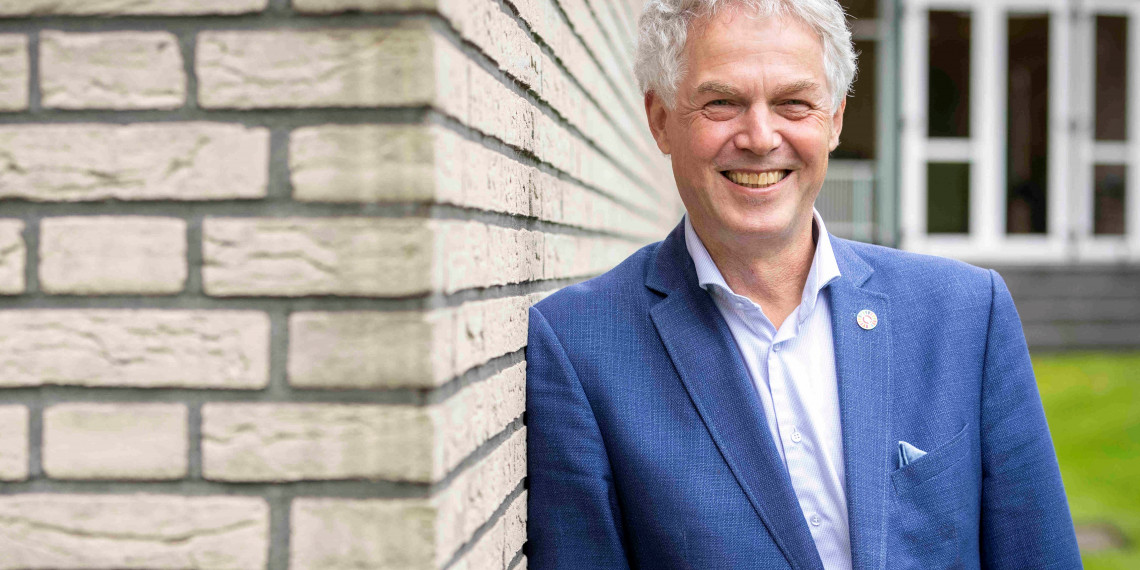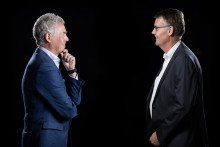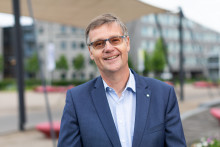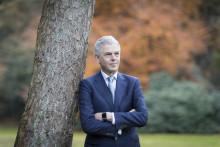Autumn is upon us as Thom Palstra heads out for one of his walks around the campus. Walking, the rector knows, is good for you. Last summer, his wife and he walked the first leg of the centuries-old pilgrimage route to Santiago de Compostella. It gave him the opportunity to reflect on what he wants to do after his rectorate and - above all - to clear his mind. Hiking twenty-five kilometres a day - with significant changes in altitude along the way - is a great way to do that.
He had only one book in his pack: Fokke Obema's De Zin van het Leven. It contains forty interviews about the meaning of life. ‘My own conclusion about that?’ The rector pauses. ‘Let me tell you what I value most in a society. We have to care for each other. How do we treat each other? How do we treat our natural environment? Those are the questions I ask myself.’
Caring for each other, sustainability and talent: if the story Palstra tells during this afternoon walk across the campus were a hiking trail, those would be the markers; the reference points in the narrative of a departing rector. Palstra locks the door behind him. He is the only one working in the Vleugel building today. ‘Let's go to the O&O Square first. To me, that is the heart of the university. I actually think it's a real shame that the Executive Board is located so far away from there.’
'As rector, I wanted to give something back to the academic community that shaped me'
Due to the pandemic, the O&O Square is quieter than usual. The rector starts his tour past the buildings. The TechMed building is up first. ‘The official opening by King Willem-Alexander was a fantastic moment.’ Ravelijn. ‘This is the cake-cutting building; it is where I got to cut the cake as rector when we earned yet another excellent score in the National Student Survey.’ Lastly, there is the Citadel. ‘This is the ATLAS building for me - although they will be moving elsewhere soon.’
‘In the field of education, ATLAS is a unique experiment. On top of that, the students feel a strong sense of societal responsibility. As rector, that was clearly evident to me. That connection between the university and our society is very important to me as well. It's a shame that the corona crisis seems to make us forget about that sometimes. We are focusing on our core tasks of education and research - which makes sense - while giving less attention to our societal impact. However, our connection to the outside world is the reason behind everything we do. It is time we redirect our attention outward again.’
As he walks on, Palstra remembers moments of societal involvement from his own personal history. ‘I took part in two demonstrations in my lifetime. I marched against the cruise missiles in the eighties and as professor against the budget cuts in the education sector under Halbe Zijlstra. Both times, I came to the conclusion afterwards that mass protest is not my style. I believe there are better ways to achieve your goals.’
Talent
Palstra turns towards the Horsttoren. Is that why he became rector in the first place - to realise his ideals? ‘No, that's not the reason. I was not inspired by some need to radically change the university or our society. As rector, I wanted to give something back to the academic community that shaped me. That is my main inspiration. Throughout my own career, I have enjoyed a wealth of opportunities. From the priest-teachers at my secondary school Rolduc to my thesis supervisor at the university and afterwards: the people I met all motivated and inspired me in some way.’
'What we do now may have an irreversible impact on our planet'
‘That is why I believe we made the wrong decision when the basic student grant was abolished. If young people are afraid to go to university because they cannot get a grant, that is an terrible shame. At the university, it is our responsibility to give talents - from students to senior researchers - the opportunity to fully flourish. How can we help students and staff realise their ambitions? It is my job to answer that question. I am convinced that the best approach is to foster a culture in which colleagues do not compete against one another, but rather support and strengthen each other. Ultimately, that is a sustainable system.’
A talent policy like that also requires diversity, Palstra states. ‘During my time as rector, we focused heavily on increasing the number of female professors at the university. Did we do enough? I don't think so. Proportionately, the percentage of female professors is still far lower than the percentage of female students. We have to keep working on this. Furthermore, gender diversity is not the only issue here. The academic world should be equally accessible to all at every level.’
Sustainability
The rector looks around. There is a long row of oak trees along the Oude Drienerloweg. ‘The importance of diversity also applies to nature itself. Look around you on the campus: everything you see is part of the cultural landscape. The campus is beautiful, but there is no room left in the Netherlands for unspoiled nature, for true biodiversity. I care about that very strongly. I believe we as a species have reached an important turning point. What we do may have an irreversible impact on our planet.’
‘That is why I feel so inspired by a party like Urgenda or David Attenborough's latest documentary. He emphasises the importance of natural balance. The Earth has a number of feedback mechanisms that allow us to live in a stable climate. Think of our forests, savannahs, prairies and the ecosystems in each of these regions. If we wish to preserve these feedback mechanisms, we must give nature more room. Foraging areas are disappearing in the Netherlands. Our insect population has also been decimated. In other words, we are destroying our ecosystems and the natural balance that they help maintain. Preventing that should be our biggest concern right now.’
Care for each other
The Hogekamp appears in the distance. There is a brand-new square in front of the imposing concrete structure. ‘To be honest, I was a bit worried when all those trees were cut down. I have to admit that the square turned out beautifully, though.’ The rector pauses. ‘Biodiversity and sustainability are themes that occupy me personally and the university as well, but I believe they should play an even more prominent role in the way the university is run.’
'Europe is very important to me and I truly feel like a European citizen'
‘At the same time, I do not want people to see me as the ‘climate rector.’ I am a firm believer in practising what you preach. Sustainability should therefore not be mentioned in the title of this interview. I am not Mr Sustainable. If this story should be my final interview as rector, I hope the main thing people take away from it is the importance of caring for each other.’
The corona crisis has made it all too clear that we are all in it together, Palstra states. ‘Luckily, this is reflected in our campus community. We work together and have each other's backs when needed. As academic mayor of this university, I am proud of this feeling of togetherness. However, it should not be limited to the campus itself. I advocate neighbourliness at the European level. Just look at Germany accepting corona patients from the Netherlands. Although the actual numbers are small, the underlying gesture is enormous.’
‘Europe is very important to me and I truly feel like a European citizen. I believe the only way to overcome the problems of our modern day and age is by embracing the European ecosystem. It is about so much more than economic considerations alone. We have to keep caring for each other as Europeans as well.’ The rector pauses to think. ‘I hope I don't sound like I have my head in the clouds. I am not one to make political statements, but I care very strongly about this.’
The end of today's walk is in sight. The same goes for Palstra's rectorate. ‘Don't forget to take these walks across the campus from time to time. That is a piece of advice I want to give to my successor Tom Veldkamp. It makes for a nice change of scenery after being stuck in meeting rooms all day and it is fully corona-proof.’ The rector opens the door of the Vleugel building once more. ‘Unfortunately, we do get some oak processionaries here in the summertime. After my first walk, I was covered in these enormous bumps. It serves as a good reminder that nature is to be enjoyed and respected in equal measure.’
Thom Palstra will officially hand over his rectorate to Tom Veldkamp on Friday during the Dies Natalis. The Dies can be attended online from 15.15 o'clock.








